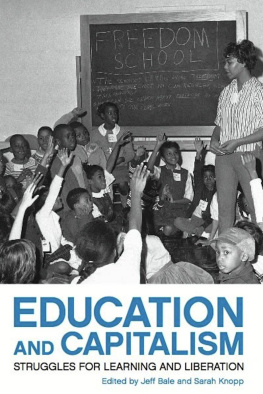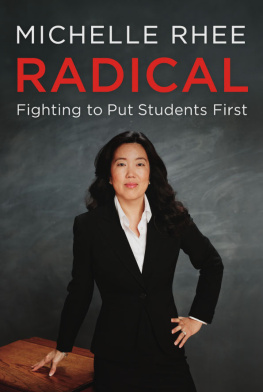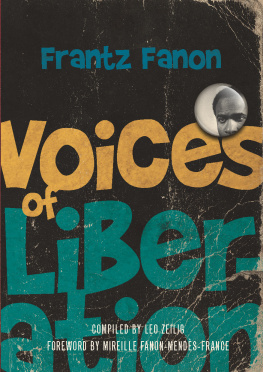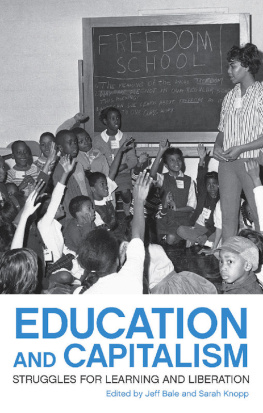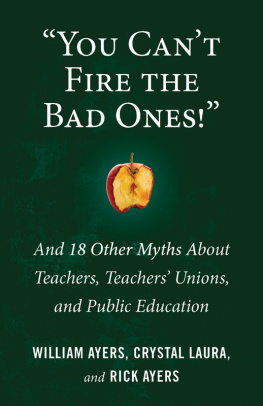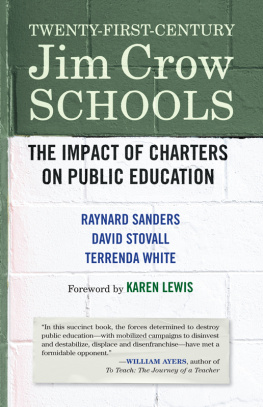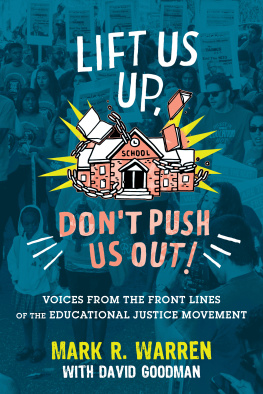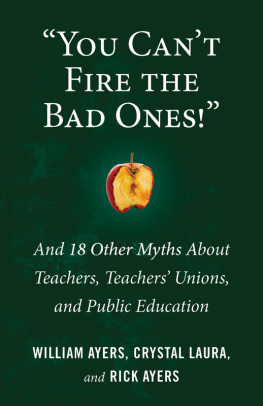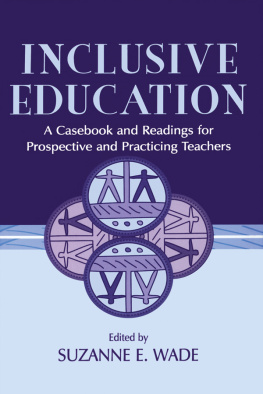Education and Capitalism
Struggles for Learning and Liberation
Copyright 2012 by Jeff Bale and Sarah Knopp
Published in 2012 by
Haymarket Books
PO Box 180165
Chicago, IL 60618
www.haymarketbooks.org
773-583-7884
ISBN: 978-1-60846-147-9
Trade distribution: In the US, Consortium Book Sales and Distribution, www.cbsd.com In Canada, Publishers Group Canada, www.pgcbooks.ca In the UK, Turnaround Publisher Services, www.turnaround-uk.com In Australia, Palgrave Macmillan, www.palgravemacmillan.com.au All other countries, Publishers Group Worldwide, www.pgw.com
Cover design by Josh On. Cover image of children attending a Freedom School in an integrated public housing project in Cincinnati during a one-day boycott of city schools organized by the Congress for Racial Equality in 1964. Gene Smith, Associated Press Photo.
Published with the generous support of Lannan Foundation and the Wallace Global Fund.
Library of Congress cataloging-in-publication data is available.
10 9 8 7 6 5 4 3 2 1
To Michal Myers, Kevi n Chojczak, and all other socialist educators who didnt live to participate in a truly liberated educational system.
Presente!
Contents
Adam Sanchez Interviews Bill Bigelow
A Defense of Public Education and an Action Plan for Change
Sarah Knopp and Jeff Bale
Schools, Marxism, and Liberation
Sarah Knopp
The Struggle for Black Education
Brian Jones
The Indian Boarding Schools
Michele Bollinger
Linguistic Justice at School
Jeff Bale
Obamas Neoliberal Agenda for Public Education
Gillian Russom
Students, Parents, and Teachers Nationwide Protest Gutting of Public Education
Rose Aguilar
Teachers Unions and Social Justice
Jesse Hagopian and John T. Green
The Madison Protests
Dan Trocolli and Sarah Knopp
Teachers Struggle in Oaxaca, Mexico
Jessie Muldoon
Pedagogy and Revolution: Reading Freire in Context
Adrienne Johnstone and Elizabeth Terzakis
The Freedom Schools
Keeanga-Yamahtta Taylor
Literacy and Revolution
Megan Behrent
Foreword
Adam Sanchez Interviews Bill Bigelow
Rethinking Schools magazine began in Milwaukee, Wisconsin, in 1986 as a local effort to address problems such as racial bias in schools and standardized testing. Since its founding, it has grown into a nationally renowned venue for critical perspectives on teaching and education, as well as an active publisher of educational materials such as curricular guides. While writing for a broad audience, Rethinking Schools emphasizes problems facing urban schools, particularly issues related to racism. Throughout its history, Rethinking Schools has tried to balance discussion of classroom practice and educational theory. It addresses key policy issues such as market-oriented reforms, funding equity, and autonomy and collective bargaining rights for teachers. Rethinking Schools defines its project as being both visionary and practical: visionary because we need to be inspired by each others vision of schooling; practical because for too long, teachers and parents have been preached at by theoreticians, far-removed from classrooms, who are long on jargon and short on specific examples.
Rethinking Schools has been an inspiration to teachers, including the contributors to this book, to see themselves as visionaries and strategists instead of implementers of mandated curriculum. Because its an activist publication, with articles written by and for teachers, parents, and students, it imagines a future where the doers are also the thinkers.
Bill Bigelow is curriculum editor of Rethinking Schools magazine. Here, he talks to Adam Sanchez, a teacher in a Portland public school and his former student, about the relationship between curriculum and struggles for justice.
Adam Sanchez: Many who have gone through the public school system in the United States leave feeling dissatisfied, bored, and/or alienated. Why do you think public schools are worth fighting for?
Bill Bigelow: You could make an even stronger case against public schools for many students. They push students out; they criminalize behaviors that dont conform to middle-class norms; schools are many students introduction to institutional punishment. More times than not, they teach an inaccurate and flag-waving version of US history and how the world works. In essence, they often strengthen racial and class inequality as well as militarism.
But public schools can also be places where students learn to read and write and to ask deep questions about the world. They can be places where young people talk with their peers about their lives and the broader world. They can learn to sing, play an instrument, act, paint, hit a curveball. And public schools are places where students can come to think of themselves as activists for social justice. Of course, any schoolpublic or otherwisecan be excellent academically, and can teach for social justice. But public schools are charged with serving all children. The public in public schools acknowledges that education is not a commodity that we buy as individuals in the marketplace. Public education reflects a social commitment to one another and to the future.
What do you think of Obamas education policies and his choice of Arne Duncan as secretary of education?
I agree with Diane Ravitch that, with respect to education, Obamas presidency has been like George Bushs third term. In fact, Race to the TopObamas initiative that takes a relatively small amount of money, dangles it in front of resource-starved states, and says, You might get it if you allow more privatization and link teacher evaluations and pay to test scoresits Bushs No Child Left Behind on steroids. I cant think of any substantial difference between Barack Obama and George Bush when it comes to education; in fact, Arne Duncan has been cozy with New Jerseys Governor Chris Christie, a huge privatizer and a hater of teacher unions. I confess that Obama and Duncans attacks on teachers and teacher unions are puzzling to me, as the unions have been some of the Democratic Partys most loyal supporters. For example, both Duncan and Obama cheered when teachers at Central Falls High School in Providence, Rhode Island, were removed en masse. But ideologically, Obama seems committed to a neoliberal model of developmentlook at his pursuit of free trade agreements all over the worldso I suppose that it shouldnt surprise us when he follows similar let the market lead policies when it comes to education. Its absurd that at a moment when the capitalist system cannot provide work for huge numbers of people, cannot provide decent health care for all, cannot provide housing for all who need it, and has brought the world to the brink of ecological collapse, that anyone should look to that same systemand the people who manage itto address our educational woes.
Many social justice educators feel that their teaching is their activism, yet at the same time teachers increasingly have less control over curriculum. For those who believe in social justice education, is what we do inside the classroom enough?
I want to start by flipping that question on its head. Ive known a lot of teachers who believe that their activism outside the classroom is sufficient. And its not. Its not enough to be a good social justice unionist, or to participate in teacher antiwar committees or worker-community alliances. I believe that teacher activism begins in the classroom, with our commitment to our students and to the communities that we serve as educators. Our first job is to be an outstanding teacher. That said, as you point out, how well we are able to serve our students and the society as a whole is being shapeddistorted, reallyby forces that are outside of what is going on in the schools themselves. As we regularly editorialize in Rethinking Schools , protecting our classrooms, protecting our craft, requires that we challenge all kinds of social priorities. As the recent struggles in Wisconsin show, the wealthy and the politicians theyve hired are attempting to defund and deform public schools. Yes, we need to teach about this and equip students to understand the roots and motives of these initiatives. But we have to be out in the streets opposing all these right-wing schemes. I do think that good teaching is a kind of activism, but the space for critical teaching will become increasingly narrow unless we get active beyond our classrooms.
Next page
